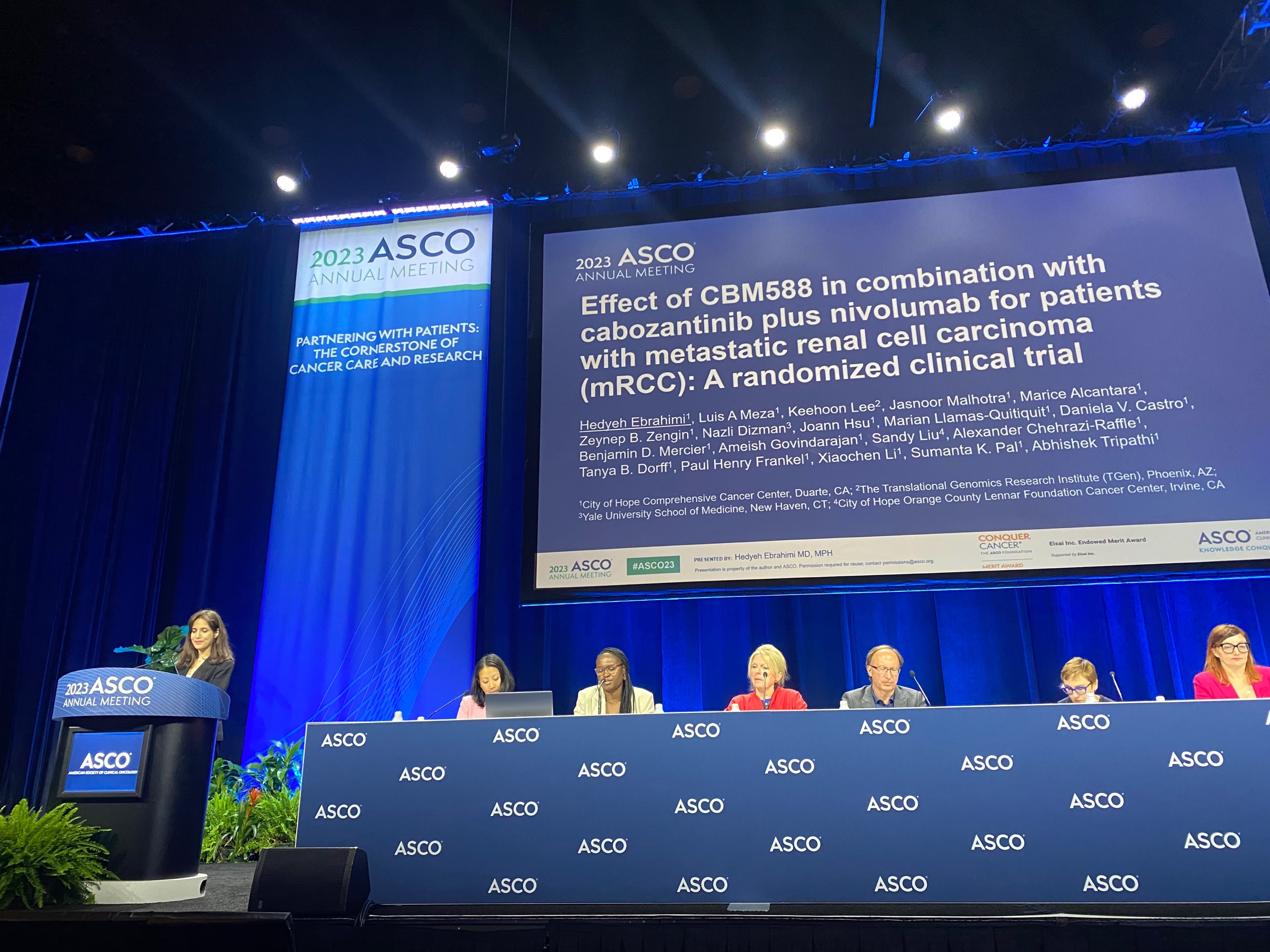https://doi.org/10.52733/KCJ21n2-e
ASCO 2023 Kidney Cancer Roundup
Cedars Cinai Cancer Center, Los Angeles, CA
Correspondence to: Email: robert.figlin@cshs.org

Dear Colleagues,
Dear Colleagues,
The journey of Belzutifan towards the goal
of getting its FDA approval for patients with
refractory renal cell carcinoma has reached
another milestone1. The FDA has granted priority
review to the supplemental new drug application
(sNDA) for belzutifan. The sNDA seeks approval
for the indication of patients with previously treated
advanced renal cell carcinoma following immune
checkpoint and anti-angiogenic therapies. The interim
findings from LITESPARK-005(NCT04195750)
demonstrates that the treatment with belzutifan led
to a statistically significant and clinically meaningful
improvement in progression-free survival (PFS)
compared with everolimus in adult patients with advanced
renal cell carcinoma whose disease progressed
following PD-1/PD-L1 and VEGF tyrosine
kinase inhibitor (TKI) treatments2.
The current study results
add to a growing body of early
phase trial results that suggest
meaningful clinical benefits
from HIF2 pathway inhibition
in patients with RCC. “This
is not only the first new
mechanism to demonstrate
potential in advanced RCC in
recent years but also the first
phase III trial to show positive
results in advanced RCC
following these therapies",
says Marjorie Green, MD,
senior vice president at Merck
Research Laboratories, in
a press release1. “Patients
with advanced RCC face
low survival rates, and for
those whose cancer progresses
following PD-1/L1 and
VEGF-TKI therapies, there is a need for new treatment
options that can reduce their risk of disease progression
or death.”

This registrational study where patients with
treatment-refractory clear cell RCC were randomized
between belzutifan and everolimus was conducted
with the goal of obtaining approval for belzutifan
in the refractory disease setting. "Based on the data
on the phase 1b/2 study we conducted in patients
with previously treated advanced RCC, it became
clear belzutifan is an active drug3,4,” Eric Jonasch,
MD, professor in the department of genitourinary
medical oncology, division of cancer medicine, at The
University of Texas MD Anderson Cancer Center
in Houston, TX. The safety portion of the analysis
showed that belzutifan’s profile was consistent
with that shown in prior studies as there were no
new safety signals with either treatment compared
with previously reported safety outcomes with the
treatments. However, the shortcoming of this study is
improvement in overall survival (OS) did not reach
statistical significance despite statistically significant
improvement demonstrated in another secondary
end point, objective response rate (ORR). OS will be
tested again at a subsequent analysis.
The impact of recent LITESPARK-005 findings
on securing the belzutifan's niche including how far
up in the treatment algorithm it could move, remains
to be seen. As expected, the investigators are already
exploring whether survival outcomes with longer
follow-up will confirm the promising initial clinical
activity of the combination in this setting. Advanced
phase trials are testing belzutifan plus lenvatinib
versus cabozantinib in the treatment refractory setting
[NCT04586231], and the addition of belzutifan to
lenvatinib and pembrolizumab as frontline therapy
[NCT04736706] are ongoing. LITESPARK-005 is
1 of 4 late-stage trials evaluating belzutifan in RCC.
Similarly, we are keeping a close eye on belzutifan’s
prospects as part of second-line (LITESPARK-011),
treatment-naïve (LITESPARK-012) and adjuvant
therapy (LITESPARK-022; belzutifan plus
pembrolizumab; NCT05239728) in advanced RCC
setting. Currently, there is a lot of excitement around
belzutifan. It is going to be interesting to see where
that agent ends up panning out in RCC.
In this issue, Shapiro and colleagues critically
evaluate the efficacy of cytoreductive nephrectomy
and explore options for integrating CN within the
contemporary systemic therapy landscape. Gessner
and colleagues summarizes the biology of hERVs,
their identified role in ccRCC, and and how hERVs
may impact response to immunotherapy in ccRCC.
In other review piece, Patel et al proposes that early
integration of palliative care into routine RCC care
can help improved decision making and patient
outcomes.
Happy fall season 2023!



